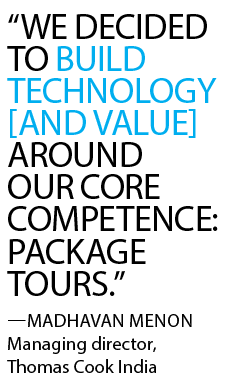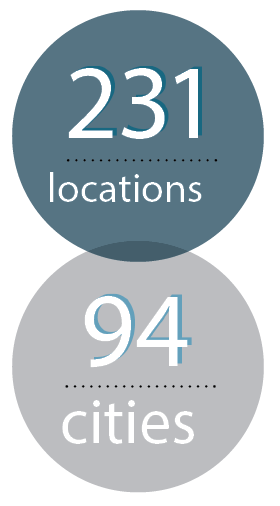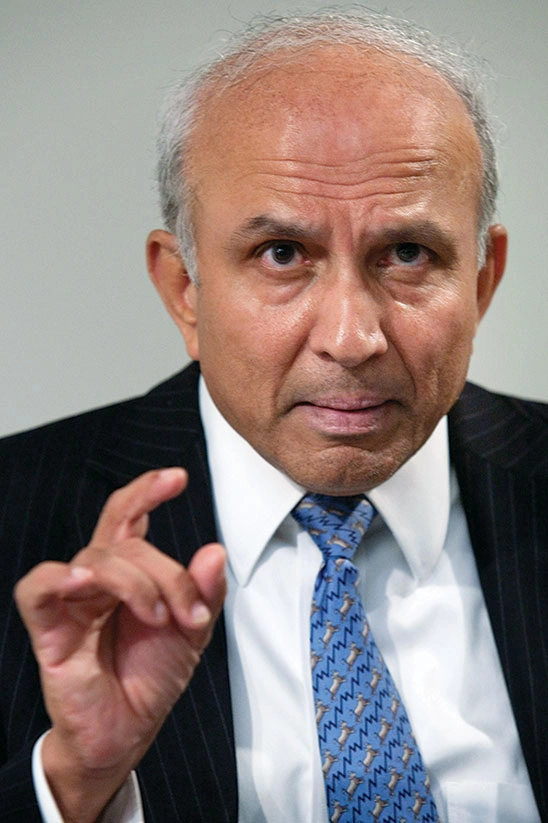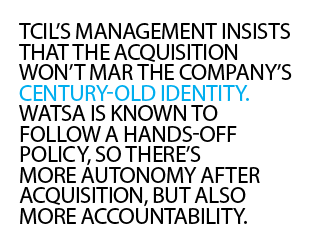When India-born billionaire investor Prem Watsa bought a 77% stake in Thomas Cook India Ltd. (TCIL) in May 2012, speculation was rife and the future unclear. Not many India units of storied multinationals get sold twice by parent companies in spite of making profits. But TCIL, set up in 1881 as a branch of its British parent Thomas Cook & Son, had to go through just that.
In early 2006, it was sold to Dubai Financial LLC, part of the Dubai Investment Group, only to be bought back in 2008. Then came the $150 million (Rs 947.5 crore at current rates) deal with Fairbridge Capital (Mauritius), a wholly owned subsidiary of Fairfax Financial Holdings promoted by Canada-based Watsa. “Thomas Cook [Britain] made a series of acquisitions between 2009 and 2012 that did not do well,” says Debasis Nandy, chief financial officer and president (commercial) of TCIL. “Banks recalled loans, which forced the company to sell off some of its assets. Thomas Cook was desperate to raise money, and it was only to salvage the parent that the offspring was sold.”

Headquartered in a heritage building in South Mumbai’s Fort area, the country’s largest integrated foreign exchange and travel services company now shares nothing more with the iconic Thomas Cook Group barring the name—which too it is allowed to use only till 2025.
Fairfax deemed TCIL a strategic investment in more ways than one. Harsha Raghavan, managing director and CEO of Fairbridge, who sits on TCIL’s board, says the company looks for sectors which promise attractive growth and free cash flow generation.
“Travel and foreign exchange facilitation are definitely among them,” says Raghavan. “We zeroed in on TCIL because we felt it was a well-run company with a stable senior management, most of whose members had been around for 15 to 20 years. I don’t think it has ever had a loss-making year in the past 30 years.”
Then there’s the “dependable” tag stuck to the business. For thousands of Indian travellers, especially Generation X-ers, TCIL has been the go-to name for booking itineraries or buying foreign exchange. “When I began travelling abroad, there was really no other reputed travel agent,” says software consultant R. Chandrasekaran, 59, who has visited the U.S., Europe, and Southeast Asia dozens of times for business and leisure. “My experience has always been so smooth that I never thought of changing.”
Following the buyout, Fairbridge raised its stake in TCIL to 87% through an open offer and then reduced it to 74% to comply with Sebi norms for minimum public float. Currently it owns 68%. (“That’s because after the acquisition of Sterling Holiday Resorts, its shareholders got some TCIL shares,” says Raghavan. “We haven’t sold a single share.”)
TCIL’s management insists that the acquisition won’t mar the company’s century-old identity. Watsa is known to follow a hands-off policy, so there’s more autonomy after acquisition, but also more accountability. “That is the Fairfax culture,” says Madhavan Menon, managing director, TCIL.
The furious churn afoot at TCIL these days will require that kind of trust. At once, the company has opened several fronts: It is ramping up its core business, implementing a digital shift, and rolling out a spate of acquisitions with the mandate to bulk up Fairfax’s portfolio (more on that later). Whether it will eventually become a holding company and allow Watsa to execute a stronger India push is a matter of conjecture. But meanwhile, the core business must deliver enough to pay or at least part-pay for some of these ambitious investments.
In spite of the highly fragmented domestic market, travel has always been a lucrative sector and is likely to see a spurt in growth on the back of visa reforms, a report by the World Travel and Tourism Council says. The Indian travel and tourism industry is poised to grow 7.5% in 2015, exceeding the 6.9% growth predicted for the entire South Asian region, the council says. According to a recent Deutsche Bank report, it will grow at a compounded annual growth rate (CAGR) of 10% for the next five years to touch $111 billion by 2020. But plugging into all this growth won’t be easy for TCIL, a typical legacy company in an industry that has witnessed enormous disruption, with almost every slice of the business—from ticketing to package tours—shifting online.

For starters, there’s the fuddy-duddy culture built over the years. “When I joined, I was surprised to find that people were still signing pink paper vouchers for expense claims,” notes Amit Madhan, TCIL’s chief operating officer and one of the early post-acquisition hires.
Then there’s the enormous ground the company must cover online. Until the takeover TCIL’s online presence was minimal, mostly due to lack of funding. “Even in 2002, someone told me the company would never survive the onslaught of online travel companies,” recalls Menon. The competition is brutal as a customer can shop for all their travel needs online without going through a mediator, striking at the very raison d’être of TCIL.
One of the first things managing director Menon and his team did was to roll out an offline-online hybrid model. “But instead of competing with the likes of MakeMyTrip.com, mostly thriving on the ticketing business, we decided to build the technology [and value] around our core competence: package tours,” says Menon. As part of the overhaul, TCIL plans to bring new packages online, designed to entice outbound as well as domestic travellers, and corporate clients as well as young people looking for pocket-friendly tours. “For instance, the younger generation is more into domestic travel and Southeast Asian destinations,” says Madhan. “When people touch 40, they start going to Europe. We have to align our products to such trends.” Menon points out that while the challenge is a hairy one, TCIL has one key advantage. “Unlike online travel agencies (OTAs) that are battling one another and spending huge amounts for brand building, we never had to build the brand. It was already there,” he says.
TCIL’s footprint extends to over 231 locations (including 23 airport counters) in 94 cities across India, Mauritius, and Sri Lanka. In 2012 the company launched a prepaid multicurrency forex card in collaboration with MasterCard, which has logged some 125,000 takers to date. It was the first non-banking entity to offer such a product. The One Currency Card—a U.S. dollar-denominated preloaded card that can be used across the world without paying any currency conversion charge—followed in December 2015.
TCIL declines to get too specific about its upcoming products and strategies, like the innovation exercise it has been running for more than a year now to improve its products, or the virtual reality travel kiosks it plans to launch. “The online side of our business is like a startup, just three years old. So revenue and profit are still relatively small. But it is important to note the growth we are having year on year,” says chief innovation officer Abraham Alapatt. “The way we have leveraged our offline network and the trust we have built over the years and taken it online, is probably without parallel in the Indian travel space,” he adds. It may seem like an exaggerated claim, but there are numbers to support his pitch. Online already contributes about 7% of the company’s travel business revenue (excluding ticketing); it was next to nothing three years ago.

To boost that share, the company is looking to tie up with digital disruptors. In November, TCIL partnered with Oyo Rooms, a budget hotel aggregator. Menon calls this partnership, which will give Thomas Cook customers access to Oyo’s countrywide network of 3-star hotels with standardise features, a coup. “While on vacation, customers want everything arranged for them,” he says. “Oyo has a vast pool of hotels, which will dovetail into our online strategy without us having to build a platform that would require huge investment.” Market rumour has it that a similar deal is being worked upon with homestay major Airbnb.
“Disruptors are a worry only if you see them as competition,” points out Alapatt, “not if you look at them as an opportunity to collaborate. Apart from hotels, there’s train and bus travel. All these have a huge market, but earlier it was outside the ambit of organised travel. Now, thanks to redBus or Airbnb or Uber, a lot of integration is becoming possible. These are the services that customers need—if we can make them available, why not?” It is worth pointing out that such alliances are not restricted to the travel business. In retail too, several brick-and-mortar players have tied up with e-commerce firms as a bridge to the digital world (see ‘Making Shoppers Stop Cool Again’ in the December 2015 issue).
TCIL says these partnerships will help boost its domestic business, which has traditionally played second fiddle to international travel, and contribute around Rs 80 crore in revenue in FY16.
The real danger, though, lies elsewhere: in the mindset of the millennial traveller who has a bias towards experimentation and experiential value. Divia Thani Daswani, editor of the travel magazine Condé Nast Traveller India, says wooing this demographic is all about offering customised trips, personalised services, and most important, specialised categories (adventure travel, for instance). And there are smaller boutique operators (such as Trabblr or Thrillophilia) that are doing just that. That’s a challenge for large players like TCIL that don’t necessarily have a presence in very niche verticals.

“For people who know what exactly they are looking for, it makes sense to go to somebody who has specialised knowledge. The big companies have to realise that the consumer is getting younger, very well informed, and needs to have a reason to seek out a travel agent. It’s a massive opportunity really, but you have to make a lot of effort to have one-on-one conversations and understand the customer,” Daswani says.
However, Daswani feels that tour operators like TCIL will continue to thrive for a couple of reasons. One, the reputation built over decades. Second, Indians expect a high degree of service when it comes to travel and hospitality. A lot of people, when they are, say, in the middle of Africa and want to change their bookings, don’t like to get on the phone or get online to try and do it themselves. It’s easier to call the tour operator at 8 in the evening and get the work done by next morning.
Anil Khandelwal, chief financial officer of Cox & Kings, TCIL’s biggest rival, concurs. “When it comes to high-value, complex itineraries, especially when it’s outbound travel, people want face-to-face interaction. It also helps if the buyer has some [inhibitions about] making online payments.” He claims that big tour operators provide a complete package of various experiences which is substantially cheaper than what a consumer would get directly. The reason: They get good discounts from their partners due to consistent business. “The consumer today has the purchasing power and is moving to the organised market. That obviously helps organised tour operators like us,” Khandelwal adds.

“We provide a safety net in case something goes wrong,” says Alapatt. “When you fly a standard airline, stay at a standard hotel, do standard sightseeing and come back, there’s very little risk. But when you are going to stay at a B&B or homestay, you really don’t know. I think that’s where the trust and reassurance of an established player making the arrangements for you makes a difference.”
Like Khandelwal, Alapatt doesn’t acknowledge online competitors as big threats. “When people say travelling has gone online, they don’t realise that it is only the ticketing part that has gone online in a big way. Travel has not,” he says. “One should not be misled by the top line value of tickets alone. That value is accruing to the airlines.” Alapatt argues that the commission for OTAs can be as low as a few hundred rupees per ticket. In domestic ticketing, which forms the bulk of the OTAs’ revenue, there’s zero commission from many of the low-cost carriers. “We don’t do that. If I put in effort to drive a customer, I want to make some money. The RoI has to be clear,” Alapatt adds.
However, he acknowledges that listening closely to the market will be vital to stay relevant. “We have to be better at providing integrated packages, must be more efficient, must enable non-standard experiences the customer may not otherwise be able to access,” he says.
TCIL is also banking on a series of acquisitions to unlock significant value. The first acquisition, in 2013, was of Bengaluru-based Ikya Human Solutions—since renamed Quess Corp—a staffing firm in which it took a 74% stake for Rs 256 crore. The second came the year after when it bought out the pioneering but struggling timeshare hospitality firm Sterling Holiday Resorts (India) for Rs 870 crore. Neither of these companies is aligned to TCIL’s core travel-planning business, but that is not surprising, given that Fairfax had made it clear that TCIL would be its investment vehicle in India—and not necessarily in the travel sector alone.
There are early signs of a turnaround at Sterling Resorts. TCIL has invested an additional Rs 180 crore in the company, paying off loans worth Rs 50 crore, and increasing the number of resorts from 16 to 30. Occupancy rates have risen, and in FY15, Sterling had its first full year of profitability since FY97, with a modest PAT of Rs 50 lakh on a total operating income of Rs 187 crore. What gave TCIL and Fairfax further confidence was that Ramesh Ramanathan, who had been vice president of Sterling from 1991 to 1996 and quit to join rival Mahindra Holidays as CEO, returned as MD in 2011. “Thomas Cook [India] has given us very good brand association and much-needed stability,” says Ramanathan.
The diversification outside travel planning may appear to pose the risk of diluting the core business. But Raghavan of Fairbridge says “the free cash flow at TCIL has been tremendous, enabling us to carry out a number of follow-on acquisitions”.

These include three key buys in the travel space. In December the company acquired Kuoni Group’s travel businesses in India and Hong Kong for Rs 535 crore and Rs 215 crore, respectively. “There are various opportunities built into the Kuoni buyout,” says Menon. Kuoni India, for instance, owns the well-known brands SOTC and SITA. “When we lose the Thomas Cook brand in 2025, we can use one of these,” Menon adds. “Kuoni India also has a strong inbound business, which we don’t. And Kuoni Hong Kong is a profitable and niche player, sitting at China’s doorstep, which gives us an opportunity to expand into Asia.”
The third, relatively smaller acquisition of Sri Lanka-based travel firm Lux Asia—snapped up for Rs 4.5 crore last July—allows TCIL to return to the island country after it withdrew from there in the wake of the civil war. “Sri Lanka is going to develop significantly over the next couple of years,” Menon says.
If numbers are any indication, TCIL appears to be on the right track. Since Fairfax took it over, its stock has zoomed from Rs 63 to over Rs 205. However, the September quarter results were a dampener—revenue dipped to Rs 104.8 crore compared with Rs 115.7 crore in the year-ago period, with PAT at Rs 6.7 crore, down from Rs 11.4 crore.

Menon is not too worried. “Fairfax’s principle is to look at the life of a company over 25 years and not quarter on quarter or year on year,” he says. “That means we have time to build the business.” He says the company will consider expanding into Asia through acquisitions, but in India it will have to be mostly organic growth because “there aren’t too many other profitable brands left in the travel space that we want to look at”.
Raghavan too claims that Fairfax is satisfied with TCIL. “It’s the largest diversified travel company in India, with a market cap of around Rs 7,000 crore. That’s over a billion dollars, but we can still grow.” He points out that TCIL’s market share is about 0.5%, and Kuoni’s another 0.5%. “So we are still a drop in the bucket.”
However, TCIL needs to watch out for the pitfall that has been the undoing of many legacy companies in the new world: the complacency that access to cash guarantees quick market share. As Menon stepped on the brick-tiled roof of the company’s Mumbai office to pose for this story, the old structure creaked ominously and threatened to give way. His team fished out a wooden plank to set atop the tiles and soften the impact of his steps. For Menon, it’s a handy metaphor that building bridges may be the best foot forward for the company yet










Leave a Comment
Your email address will not be published. Required field are marked*